The first book of its kind to appear since the end of the Cold War, this indispensable reference provides encyclopedic coverage of communism and its impact throughout the world in the 20th century. With the opening of archives in former communist states, scholars have found new material that has expanded and sometimes altered the understanding of communism as an ideological and political force. A Dictionary of 20th-Century Communism brings this scholarship to students, teachers, and scholars in related fields. In more than 400 concise entries, the book explains what communism was, the forms it took, and the enormous role it played in world history from the Russian Revolution through the collapse of the Soviet Union and beyond.
- Examines the political, intellectual, and social influences of communism around the globe
- Features contributions from an international team of 160 scholars
- Includes more than 400 entries on major topics, such as:
Figures: Lenin, Mao, Stalin, Ho Chi Minh, Pol Pot, Castro, GorbachevEvents: Cold War, Prague Spring, Cultural Revolution, Sandinista RevolutionIdeas and concepts: Marxism-Leninism, cult of personality, laborOrganizations and movements: KGB, Comintern, Gulag, Khmer RougeRelated topics: totalitarianism, nationalism, antifascism, anticommunism, McCarthyism- Guides readers to further research through bibliographies, cross-references, and an index
Awards and Recognition
- One of Library Journal's Best Reference Books, Law & Politics Category for 2010
"Highly accessible, essay-style entries on the concepts, figures, events, movements, and organizations associated with international modern and postmodern Communist politics. . . . Each entry concludes a list of at least five further reading titles, offering researchers a springboard to subject-specific information."—Savanna Schroll Guz, Library Journal
"Access to archives in the former Soviet Union and its satellites behind the iron curtain has enabled the 160 scholars who contributed articles to this compendium to present information formerly out of the reach of all but a few in those countries. . . . No other comparable, current source covers twentieth-century communism in similar topical fashion. Recommended for academic and large public libraries."—James Rettig, Booklist
"[I]ncludes some truly insightful profiles of key figures. . . . [A] work well worth reading."—Irving Louis Horowitz, Wilson Quarterly
"An ideologically and internationally diverse lot of contributors manage to keep the tone analytical and critical throughout, making this an insightful and essential reference for 20th-century studies."—George M. Eberhart, College & Research Libraries News
"All the major names and events are covered, and an impressive variety of concepts or objects receive serious attention, too. . . . [T]he high quality of the prose, the distinguished community of authors, and the imaginative variety of topics covered will make this a worthwhile reference."—Padraic Kenney, H-Net Reviews
"The new English translation of this work provides readers with a valuable overview of the world communist movement, in 400-plus entries, including not only the history of the Soviet Union, the People's Republic of China and other communist states, but also of the various communist parties in Europe, the U.S., and the rest of the world. The volume's strengths lie in its strong coverage of European communism and its willingness to discuss the theoretical and philosophical ideas of its subjects."—Choice
"This indispensable reference explains what communism was, the forms it took, and the enormous role it played in world history."—Blackwells Recommends
"For socialists, this base of knowledge of the historical legacy of the most important revolutionary event in the 20th century, the Russian Revolution of 1917, is indispensable."—Lawrence Rockwood, The Socialist WebZine
"[A] Dictionary of 20th-Century Communism is rather different. Its entries are mostly very thorough and informative, and if one or two are written in a language that reflects the jargon of its subject, that is a small price to pay for an approach usefully empathetic to its unempathetic protagonists."—Mark Mazower, National Interest
"[T]he encyclopedia as a whole is a substantial and valuable project. The individual entries are almost all of high quality. The sustained effort at treating communism as a global movement means that Russian specialists will learn a great deal about less familiar places."—David R. Stone, Russian Review
"[T]he high quality of the prose, the distinguished community of authors, and the imaginative variety of topics covered will make this a worthwhile reference."—Padraic Kenney, H-Net Reviews
"This is a huge and useful enterprise. . . . Most of the leading figures of the history of communism, the communist parties, important institutions, ideological concepts, and political events are included in a well selected and concise form. This timely and important dictionary offers a broad historical and historiographical overview of twentieth century world communism. This is a significant step toward achieving the difficult task of encompassing communism as a historical phenomenon in its complexity."—IvanT. Berend, European Legacy
"A Dictionary of 20th-Century Communism promises to be immensely helpful to both teachers and students of world history. . . . [A] very powerful contribution to the relationship between aesthetics, culture, and fascism."—Robert W. Strayer, Journal of World History
"[A] monumental, engrossing, truly comprehensive encyclopaedia of world communism."—Vladimir Tismaneanu, International Affairs
"This important work helps bridge the gap between specialists' knowledge about communism and the general public's understanding—a gap that has only widened since the revolutions of 1989-1991. The dictionary's entries are informative and reasonable, everything one wants in a work such as this."—Eric D. Weitz, University of Minnesota
"A valuable and comprehensive research asset that provides a useful place for students to start their investigations. Among the articles are some masterful reviews by major scholars."—Ronald Grigor Suny, University of Michigan

